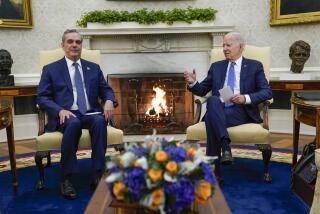Latin American Poverty Poses Threat to Globalization, Finance Group Warned
- Share via
CANCUN, Mexico — World financial leaders Thursday warned the assembled finance ministers of the Americas that a backlash against globalization could grow in Latin America unless governments find ways to reduce the region’s worsening gap between rich and poor.
“We are no better off than we were in the 1970s,” World Bank President James D. Wolfensohn said, citing poverty data for Latin America.
The debate at the third conference of the hemisphere’s 34 finance ministers focused on the risks as well as the benefits flowing from the region’s structural economic reforms since the 1980s--a hot subject in the aftermath of the anti-globalization turmoil at the World Trade Organization summit in Seattle last year.
The meeting was hosted by one of the region’s most committed free-trade nations. Mexico has the world’s eighth-largest international trade, and exports have become a cornerstone of the country’s recovery from the 1995 peso devaluation, which battered every Latin American economy.
President Ernesto Zedillo has recently criticized “globe-a-phobes,” saying that those who oppose world trade have a common goal: “to save the people of developing countries . . . from development.”
But finance ministers and global financial executives meeting here agreed that simply opening up markets won’t solve development problems.
“Growth alone does not guarantee the reduction of poverty, nor do market reforms alone guarantee growth and political stability,” Cesar Gaviria, former president of Colombia who now heads the Organization of American States, told reporters. Wolfensohn noted that 36% of the Latin American population--175 million people--live in poverty, and 15% live in extreme poverty. Indeed, the number of poor has grown by 40 million in the last 20 years, he said, despite a decade of painful structural adjustments and opening up once-protected economies.
“This is not a record that any of us is proud of,” he said. “Without addressing the issue of poverty, there is no way we can have long-term growth, because social instability will kill it--quite apart from the issues of morality and justice.”
He said a World Bank study on global poverty to be published later this year had found deep frustration and anger at the failure of governments to combat the corruption, violence and infrastructure problems that retard growth.
Despite the grim picture, the conference took place against a backdrop of economic recovery.
International Monetary Fund director Michel Camdessus said Latin America has bounced back faster than expected from the economic crises of the last two years, with growth now expected to approach 4% in 2000, nearly a percentage point above expectations a year ago.
But growth will remain constrained, he said, until poverty is tackled effectively.
“There is an interconnection between growth and social well-being that has often been neglected and that we can and must improve,” Camdessus said.
U.S. Treasury Secretary Lawrence Summers told reporters that the conference debate was “both morally oriented and analytically informed.”
“There was a shared concern on the importance of not just creating economic growth but of making that growth more inclusive,” he said. “We also agreed on the importance of improving the allocation of resources in the education and health sectors [and] of the need to evaluate what we do in a rigorous way so we create the most effective interventions.”
More to Read
Sign up for Essential California
The most important California stories and recommendations in your inbox every morning.
You may occasionally receive promotional content from the Los Angeles Times.













